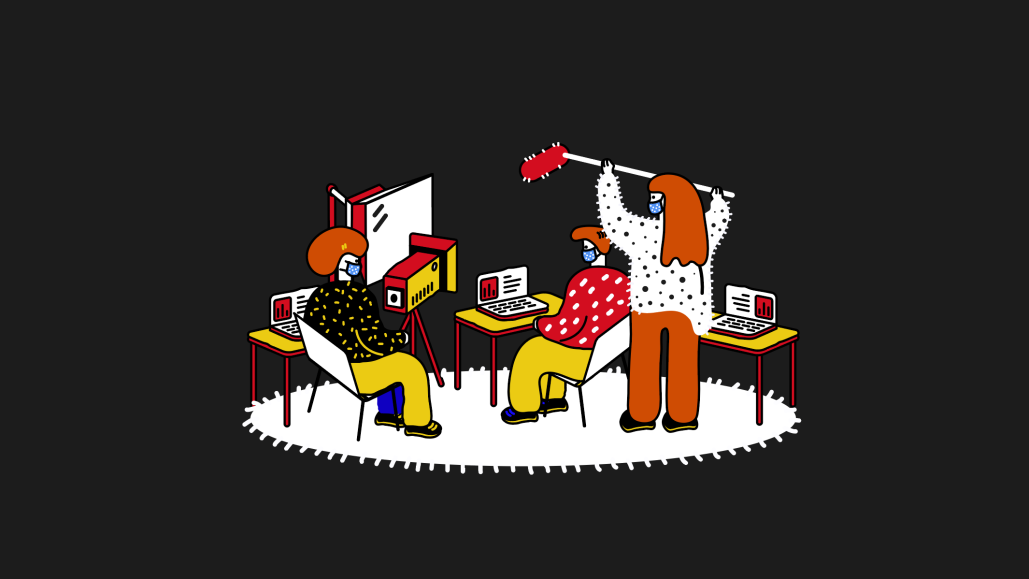Secure your place at the Digiday Media Buying Summit in Nashville, March 2-4
‘Help us solve goals that we can’t solve in person’: How Industry Dive soared revenue as B2B budgets migrated to digital

Count Industry Dive among the winners of B2B media’s coronavirus shuffle.
In a year when most media companies’ balance sheets were squeezed, the B2B digital media company launched two new verticals, acquired a content studio and grew its revenues by 30% year over year, ahead of what the company targeted for 2020, company CEO Sean Griffey said, thanks to a combination of higher traffic and advertisers moving their budgets away from events.
Industry Dive, which Falfurrias Capital Partners acquired a majority stake in last year for an undisclosed price, is solidly profitable, with 30% profit margins on $60 million in revenue, $40 million of which came its core ad business. And while the 210-person company did not hire as many people as it planned to this year, it did not have pay cuts, furloughs or layoffs either, and it has plans to go on a hiring spree next year: Industry Dive now has 80 journalists, and plans to hire another 20 next year, Griffey said.
Some of those reporters will be added to Industry Dive’s 20 existing verticals, which range from biopharmaceuticals to trucking, while others will be used to launch new verticals; Griffey said he plans to launch another vertical in the first quarter of 2021, and more after that. In addition to the homegrown verticals, the B2B publisher has its eye out for further acquisitions.
Griffey declined to give specifics about which verticals were next, saying only that Industry Dive focuses on industries being disrupted by digital technology and highly affected by regulation.
“When there are shocks, it’s great from an audience standpoint,” Griffey said. “But when budgets get real tight for folks, being able to generate real demand for partners is key.”
Unlike most B2B publishers, which often rely on events for significant chunks of revenue, Industry Dive focuses principally on digital ad revenue.
For Industry Dive, which scrapped plans to buy an events business earlier this year, that focus came in handy this summer when B2B advertisers went hunting for other ways to spend their experiential marketing budgets; shortly after coronavirus lockdowns began, 43% of U.S. B2B advertisers said they’d reallocate budgets reserved for events to digital advertising, according to eMarketer.
“Our clients often had budgets where they said, ‘Help us solve goals that we can’t solve in person now,’” Griffey said.
That shift helped drive U.S. B2B ad spending to stronger growth than it had in 2019. That same eMarketer research, released in August, projected that U.S. B2B digital ad spending will rise 23% this year to $8.14 billion, stronger growth than the sector recorded in 2019.
It also made B2B publishers who could drive leads a more attractive place to spend money. As budgets migrated out of events and into digital, much of it flowed into digital platforms initially, driving significant jumps in price, said Adam Smartschan, the chief strategy officer of the B2B agency Altitude Marketing.
“CPCs are freakin’ expensive right now,” Smartschan said, who said that $4 CPCs on LinkedIn last year now reliably go for as much as $10. “So as an agency, we’ve had to look at more exotic places to spend digital budgets.”
With the outlook for the return of in-person events still murky, Industry Dive’s ads business should be able to continue to deepen its relationships with advertisers. In July, it acquired the content studio owned by the content marketing software firm NewsCred, rolling it into its own content studio, called Studio ID, in October. Studio ID has accounted for $20 million in revenue this year.
While the B2B ad market did not suffer the same shock to its system that the B2C market did, some of the latter market’s trends appeared in the former this year. Advertisers, Griffey said, have been making shorter commitments than in years past, citing economic uncertainty.
It is too early to tell whether that short-term thinking will become a new normal, but Griffey said he’ll find out soon enough, when Industry Dive’s clients begin discussing how and when they’ll spend their annual budgets.
“If everyone buys quarterly, we’ll know it’s real,” Griffey said.
More in Media

From feeds to streets: How mega influencer Haley Baylee is diversifying beyond platform algorithms
Kalil is partnering with LinkNYC to take her social media content into the real world and the streets of NYC.

‘A brand trip’: How the creator economy showed up at this year’s Super Bowl
Super Bowl 2026 had more on-the-ground brand activations and creator participation than ever, showcasing how it’s become a massive IRL moment for the creator economy.

Media Briefing: Turning scraped content into paid assets — Amazon and Microsoft build AI marketplaces
Amazon plans an AI content marketplace to join Microsoft’s efforts and pay publishers — but it relies on AI com stop scraping for free.





